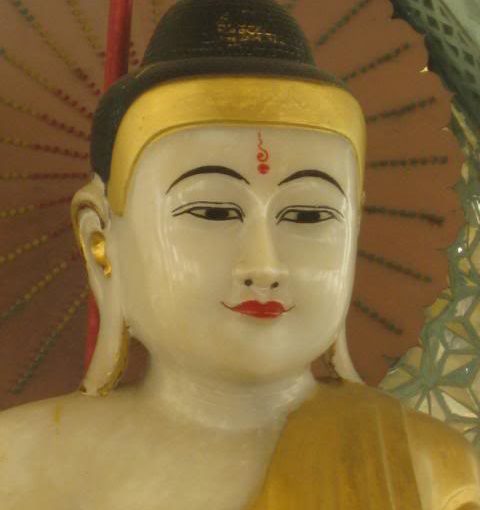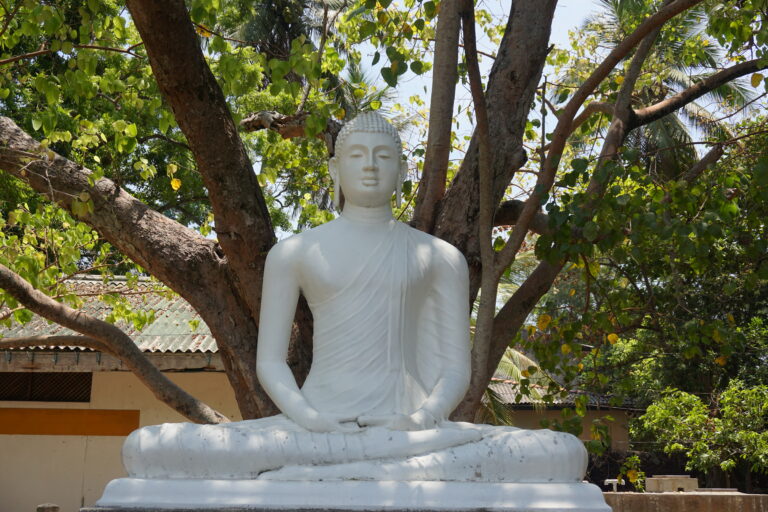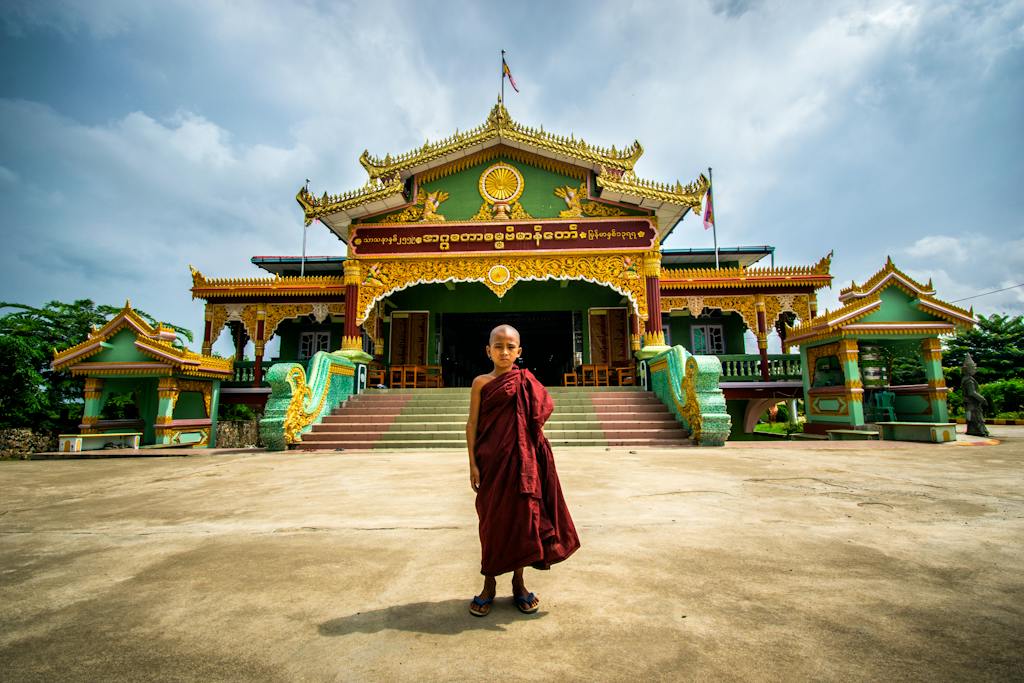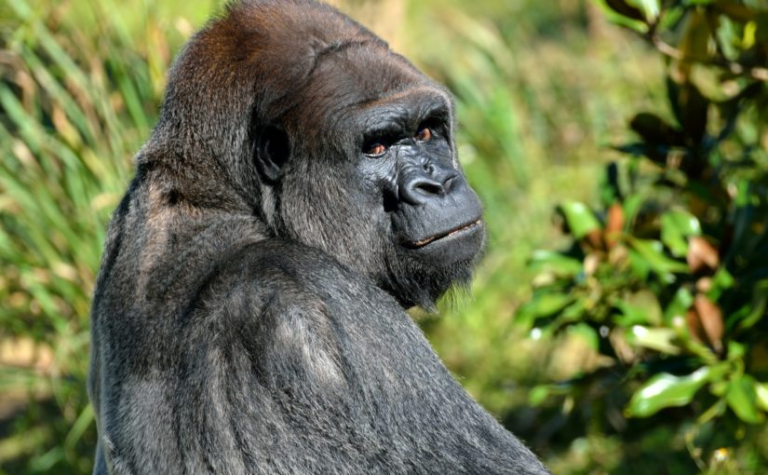Government Spies and a Monk With Crazy Ear Hair
Adventure Bucket employs affiliate links in some posts. I feature only products I trust. Clicking and purchasing through these links may earn me a commission at no extra cost to you.

Next on the itinerary is a trip to 2000 year old golden temple Sule Paya, said to contain one of the hairs of the Buddha. My driver parks in a lot about a block away and tells me to “just cross street!” Easier said than done- this is the busiest intersection in Yangon and crossing the street looks about as easy as running with the bulls. I duck into the road behind a group of nuns and hope people will at least swerve to avoid them.
At 9:00 a.m. it’s already boiling hot and the marble pavilion burns the soles of my bare feet. I’ve made my customary counter-clockwise loop around the jumble of golden Buddhas, neon lights, and praying, chanting Buddhists and am about to leave when a shriveled old monk calls out to me from a tiny alcove. “Hello! Where do you come from?”
“The United States,” I answer, somewhat hesitantly.
“Ah!” He throws his hands up with obvious glee. “Barack Obama!” He motions me closer and I notice he has more ear hair than anyone I’ve ever seen. He scoots into the shade and offers me a seat. He holds up a small transistor radio in a pink plastic bag. “I love Americans. An American gave me this radio.”
My new friend immediately wants to know anything I can tell him about the outside world, American politics, Lyndon B. Johnson, Richard Nixon, JFK, and, oddly, whether Pirates of the Caribbean was based on a true story. Within minutes I realize that this elderly monk from a third world country knows as much about American political history as anyone I know. I ask him where he learned so much and he points to his radio. It’s contraband, and there are no real radio stations in Burma anyway, but he says sometimes at night he can pick up BBC broadcasts out of Singapore. He also talks to every white tourist he sees and asks them for their old newspapers and magazines.
The conversation turns to why I have come to Myanmar. “Are you a journalist?” he asks hopefully. He seems disappointed when I say no.
He tells me that many people come to Sule Paya to worship because it contains a hair of the Buddha, but the hair is sealed up inside the golden zedi. “Botataung is better. You can see the Buddha’s hair.” I nod. Maybe I will go there later, I tell him.
He stands up and motions for me to follow him back out into the heat. A woman is chanting as she pours small cups of water over the head of a Buddha with a tiger in front of him. I ask my new friend what she’s doing and he tells me she was probably born on Monday. “People born on Monday are ruled by the moon and the spirit of the tiger.”
I tell him I was also born on a Monday, and he says I must always pray at the Monday area when I am at a temple. The woman finishes, and he motions for me to approach the statue. A small girl with a bucket darts in front of us and the monk explains, “Many people in the city have no running water, so they send their children here to take some, for drinking and bathing.”
The tiny girl finishes filling her bucket, flashes us a big smile, and ambles off with her water.
The monk tells me, “You take the cup, fill with water, and pour over the Buddha’s head once for every year of your life, to acknowledge all of the blessings you have received, plus one more time for a long life. While you do this, you pray silently for peace and prosperity.” As I pour my 30 cups over tiger-Buddha’s head, the monk chants quietly beside me. Peace and prosperity sound great, but I think the cold water splashing down on my feet is the best part. When I finish, the monk nods his approval and says, “I would have guessed you were born on Monday. You look like a tiger!”
He starts out of the Paya onto the sidewalk where little girls are selling caged sparrows and he motions over his shoulder for me to follow him. I do, and it never occurs to me to ask him where we’re going. He immediately turns down an alley filled with huge piles of garbage and that open-sewer smell I’ve come to associate with Yangon. I see motion behind one of the trash piles and realize people live here. As my eyes adjust to the semi-darkness, I realize a lot of people live here.
A man with vacant eyes rubs the legs of his sick, moaning child as she lies on a towel in the street. Nearby a dirty, naked baby picks up bits of trash from the gutter and puts them in his mouth.
I look at the monk and he says, “Every alley in Yangon you will see this same thing. Many of these people were forced into slavery by our government, and when they became injured from building roads and such, they were sent back here to starve, unable to work.”
We leave the alley and continue to walk as he tells me his thoughts on Barack Obama (“I liked him very much at first, now I still like him but I’m not sure about Joe Biden.”) and the United Nations (not doing enough for the people of Myanmar) to NASA (“Very impressive that they can send things into space like that. It hardly seems possible that one nation can be so advanced when others cannot even feed their children.”)
He is very vocal about the way the Burmese government abuses and mistreats the people, and, like July, asks me if I am aware of The Lady and her struggle for democracy. I tell him I am, and he says many of his friends and brothers were among the 4000 monks slaughtered in the streets in 1988 during a peaceful protest.
He only survived by covering himself with the bodies of his dead brethren and lying motionless for hours until it was safe to flee. Thousands more were arrested and taken to Insein Prison, but have never been seen or heard from again. “This is why we need the United States and United Nations to speak for us. We speak for ourselves and we are killed.”
I ask why he is so comfortable speaking about these matters in the street with so many people around, and he shrugs. “Let them arrest me or kill me. At least I won’t die sitting around like a sheep, as so many of these people who have no hope left. I am a very old man and will die one day soon anyway.”
I finally think to ask where we are walking, and he says, “Botataung Paya. So you can see the Buddha hair.” And then we arrive at the small temple, surrounded by the usual throng of vendors and taxi drivers and small kids hoping for candy to materialize from foreign pockets.
Inside the star-shaped pagoda is a maze of mirrors with the faithful hunched down and praying in corners, chanting and counting their mala beads. The monk, whose name I never learned, points me toward an excited mob of people gathered around a tiny window. “Buddha hair. Go look. I’ll wait.”
It takes me ten minutes to work my way to the front of the crowd, and when I finally stand on tiptoes to peer into the window, all I see are dusty flowers, gold and ivory carvings. It’s so hot I’m getting dizzy, and someone is grinding their elbow into my ribs. I’m happy to take their word that there’s a sacred hair in there somewhere if it means getting out of this mob.
My self appointed tour guide then leads the way into the mirrored maze and finds a cool place for us to sit. I tell him my driver is still waiting back at Sule Paya, and he asks why we walked if I had a driver.
As he continues to talk politics, I ask him if I can take his picture. This attracts the attention of two young monks who immediately charge over and ask my name. I tell them, and they want to know where I am from. One walks away immediately, but the other stares at me suspiciously before stepping away and continuing to watch us out of the corner of his eye.
The old monk leans over and says quietly, “Don’t tell them anything else. Those are not monks.” He gets up and motions for me to follow him outside, where he continues, “Did you notice how forcefully they spoke, and with such loud voices in a temple? Also that they did not greet me even though I am their elder? Because they are not monks, but spies for the government.”
At this point I am more than ready to go back to my driver before the pseudomonks come chasing after us with one of the armed soldiers who stand on every corner. I tell the monk that it will be faster if we take a taxi back to Sule, and that I will pay for it. “No, no,” he protests. “This is far too expensive. It will cost a thousand kyat!” (Approximately one US dollar.) I tell him that is OK, but he persists. “The bus will only cost 100 kyat!” Again I tell him that I can pay the 1000 kyat and he marvels at my apparent wealth. “And I can ride with you? I have never been in a taxi before.”
I marvel right back at him. I assure him that he can come along for the ride and ask him if he will get us a taxi from the row of cars and drivers waiting in front of us.
I watch, puzzled, as he moves from taxi to taxi, speaking in rapid Burmese to the drivers, who simply look away and shake their heads ‘no’.
“Don’t try to negotiate with them- I’ll pay the 1000 kyat!” I call.
He shakes his head. “You don’t understand. No one will take a monk and a western woman together in the same car.”
Just as I am about to apologize for leaving him behind and getting my own cab, a man runs up and says he’s found a driver to take us. He turns to the monk and tells him in Burmese that there will be an additional 500 kyat fee for the unseemliness of the situation. I’m already in the back seat before my monk can protest.
On the way back to Sule Paya, I ask why monks were the ones who protested against the military rulers, rather than ordinary citizens. The old man smiles. “Many people just think of us as scholars, and very religious, but they forget. When I was a young man, we were trained as warriors.”







